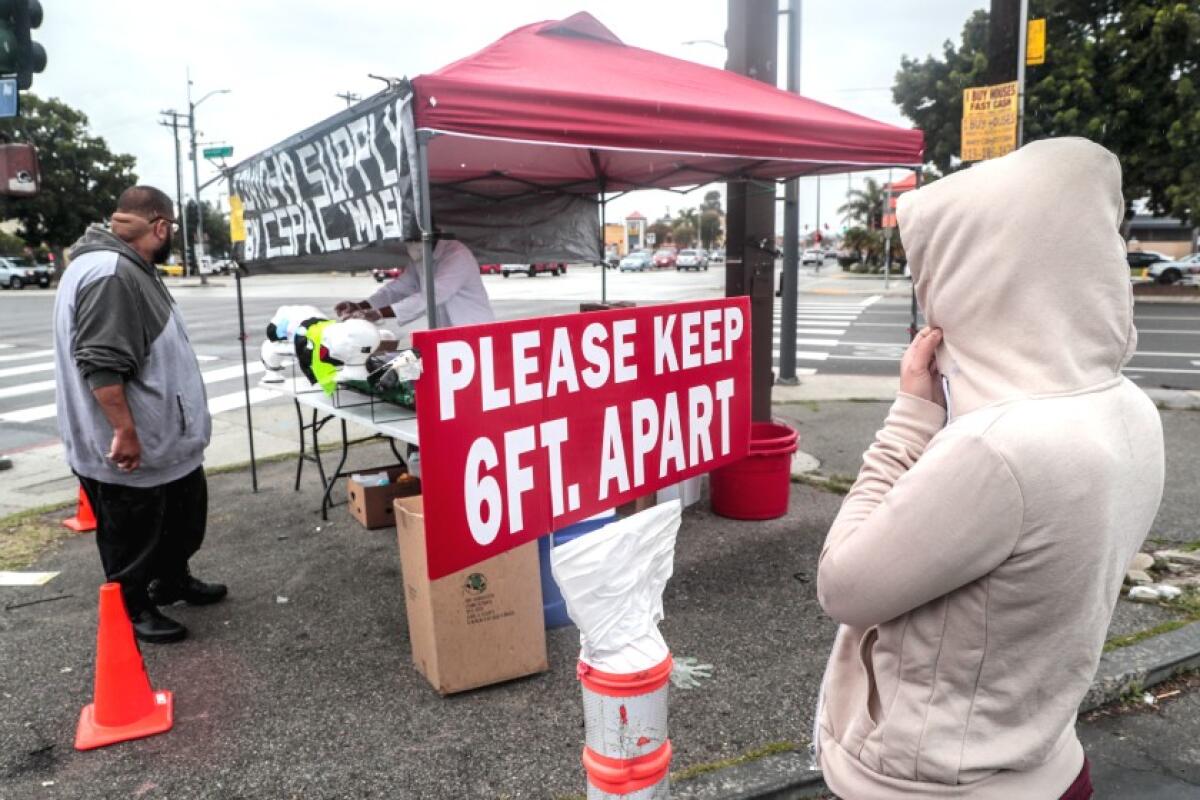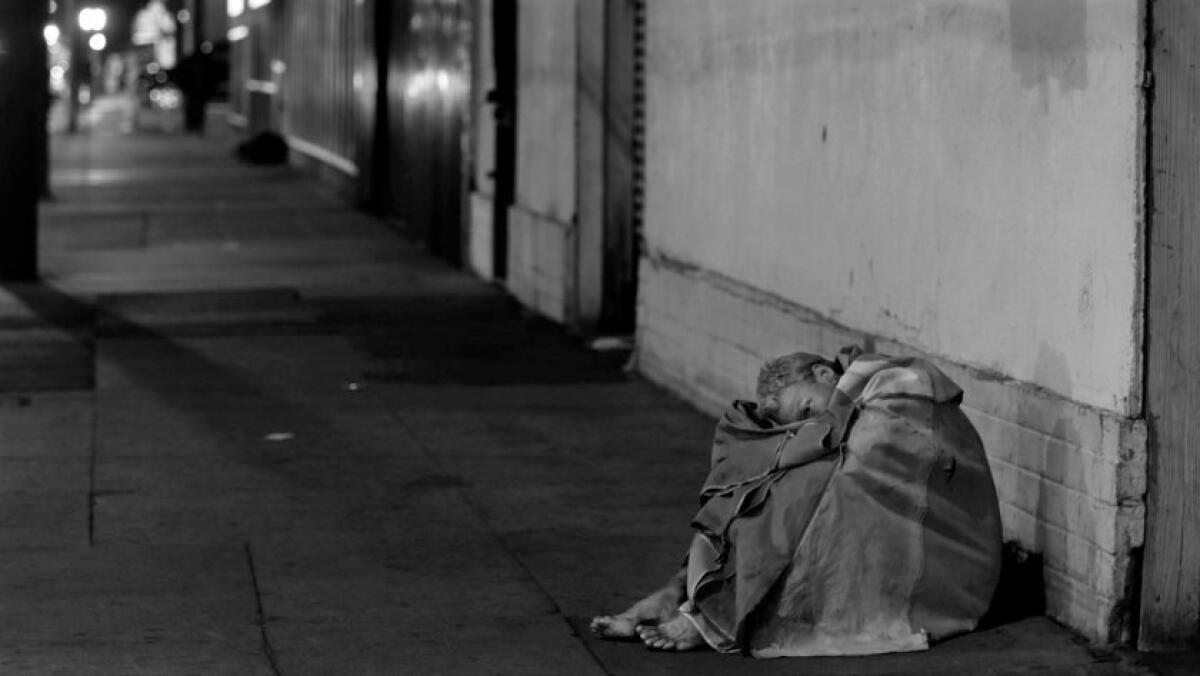What a COVID-19 pill could mean for California

- Share via
Good morning, and welcome to the Essential California newsletter. It’s Thursday, Nov. 4. I’m Justin Ray.
When the state celebrated its full economic reopening in mid-June, California was reporting fewer than 1,000 new coronavirus cases a day. Now, the state is averaging between 5,000 and 6,000, The Times reported recently.
I say this as a reminder that we’re not out of the woods yet. That’s why I’ve been interested in learning more about molnupiravir, an experimental COVID-19 pill that may become vital to millions all across the world.
The drug’s name is inspired by Thor’s hammer, Mjölnir. It doesn’t prevent people from getting COVID-19, but in clinical trials, it made their symptoms less severe and helped them recover faster.
Scientists at the U.S. Food and Drug Administration are evaluating that trial data, and one of the agency’s advisory boards will discuss the pill at a meeting later this month. If all goes well, it could be authorized for emergency use soon after.
I reached out to experts at the California Department of Public Health and elsewhere to learn more. Here’s what you should know about molnupiravir:
What does this pill do?
Molnupiravir disrupts the coronavirus’ ability to copy itself inside human cells, a type of biological sabotage called “lethal mutagenesis.”
“The drug tricks the virus into using its recipe for replication, then inserts a program that generates so many mutations that the virus quickly sputters and dies,” The Times’ Melissa Healy explains.
Who is the pill for?
Merck and its partner, Ridgeback Biotherapeutics, say it can treat adult patients with mild or moderate cases of COVID-19 who face a high risk of becoming severely ill and needing hospital treatment.
Has it been tested?
Yes. Merck’s trial included 75 adults who were newly diagnosed with COVID-19 and were at higher risk of severe illness due to underlying health conditions. Some of the trial participants were given a placebo, and some were given the real drug.
Among those who received molnupiravir, 7.3% were either hospitalized or died at the end of 30 days. That compares with 14.1% of the patients who got the placebo. After that time period, none of the patients who got the drug died, although there were eight deaths in the placebo group, the companies said.
What could this mean for the pandemic?
“In general, having more options for treatment or prevention of COVID disease is beneficial,” the California Department of Public Health said in a statement to The Times. Molnupiravir could be particularly useful because it’s easier for patients to swallow a pill at home than to get antibody treatment through an IV, the agency added.
If the FDA authorizes the pill, it “will hopefully decrease individuals seeking and taking unapproved, untested and potentially unsafe products,” the statement said.
Dr. Robert Wachter, chair of the Department of Medicine at UC San Francisco, said the pill will likely “prevent hospitals from getting overloaded if we ever have another surge.” He added that “it’s probably most valuable for unvaccinated people, who have the highest risk of a bad outcome.”
How would patients get the pills?
The state would be responsible for distributing the Merck antiviral pill to California medical providers, just as it does with COVID-19 vaccines and antibody treatments.
“The specifics of the model will depend on the details of how the FDA recommends use of the antiviral medication,” the Department of Public Health said, emphasizing that it will work to “ensure equitable distribution across California.”
If people don’t trust COVID-19 vaccines, why would they trust this pill?
Good question. Maybe they won’t.
“This is why we have the FDA — a strong, independent, science-minded body that makes the call about whether the pills or vaccines are safe and effective,” Wachter said.
Perhaps having more evidence-based options on the table will encourage people to choose a treatment supported by science over one that isn’t.
“I can’t understand why people would flock to unproven treatments like hydroxychloroquine and now ivermectin when we have other proven things like vaccines and the antiviral pill,” Wachter said. “People believe what they want to believe, and it seems clear that there isn’t much we can do about it.”
And now, here’s what’s happening across California:
Note: Some of the sites we link to may limit the number of stories you can access without subscribing.
L.A. STORIES
When will L.A. County lift its mask mandate? Here’s what needs to happen. The county’s metrics for de-masking are strict: coronavirus community transmission has to fall significantly below current levels; the number of people hospitalized with COVID-19 has to decline and stay low; and more people have to complete their vaccination series. In addition, masks could be removed only in select indoor public settings if everyone there is fully vaccinated and a process is in place to verify vaccination status. Even under the new L.A. County guidelines, masking would still be required at indoor events with 1,000 or more people. Los Angeles Times

L.A. schools replace cops with restorative justice. Los Angeles School Police officers cannot enter buildings unless they are asked to do so. It’s part of Los Angeles Unified School District’s response to the George Floyd uprisings last year. The district cut its police budget by $25 million in the summer of 2020 and redirected that money toward a $36.5-million Black Student Achievement Plan. That plan includes the hiring of mental health counselors at 53 schools with high concentrations of Black students. Capital and Main
Our daily news podcast
If you’re a fan of this newsletter, you’ll probably love our new daily podcast, “The Times,” hosted by columnist Gustavo Arellano, along with reporters from across our newsroom. Every weekday, it takes you beyond the headlines. Subscribe on Apple Podcasts and follow on Spotify.
POLITICS AND GOVERNMENT
The city of Los Angeles has made a major shift in its approach to homelessness. In the last month, City Council members have identified nearly 300 locations where they would like to ban camping under a new law that was passed in August. There is widespread agreement that the street encampments are unsafe, unsanitary and inhumane. But there is also concern that the change in direction elevates politics over need, with policies that prioritize clearing street encampments even when there’s insufficient permanent housing for the people being moved. Los Angeles Times

Los Angeles Mayor Eric Garcetti has tested positive for COVID-19, his office announced Wednesday. Garcetti, who is fully vaccinated and currently in Glasgow, Scotland, “is feeling good and isolating in his hotel room,” according to a statement posted on Twitter. Los Angeles Times
CRIME AND COURTS
San Francisco Dist. Atty. Chesa Boudin charged a San Francisco police officer with homicide for a 2017 shooting. Officer Kenneth Cha was charged with voluntary manslaughter, becoming the second police officer to be charged with a homicide on active duty in the department’s history. Cha also faces a charge of assault with a semiautomatic firearm, along with enhancements for infliction of bodily harm. Sean Moore, the unarmed man Cha shot, died three years later while an inmate at San Quentin State Prison. The Marin County coroner’s report indicated the cause of death was a homicide and that he died from acute intestinal obstruction as a result of the bullet wounds. Los Angeles Times
New season of “Slow Burn” podcast focuses on the 1992 L.A. riots. You may know Slate’s popular “Slow Burn” podcast from their seasons on Watergate, the Monica Lewinsky-Bill Clinton affair, and the murders of hip-hop icons Tupac Shakur and the Notorious B.I.G. Its latest season covers the 1992 L.A. riots. Host Joel Anderson “will investigate the long — and largely unchecked — history of LAPD racist police abuse, the tensions between Black political leadership and a largely white police force, and the media’s role in the riot coverage,” according to a news release. Spotify
Support our journalism
HEALTH AND THE ENVIRONMENT
A California judge sided with top drug manufacturers as local governments seek billions to cover their costs from the nation’s opioid epidemic. In a tentative ruling, Orange County Superior Court Judge Peter Wilson said the governments hadn’t proven the drug companies used deceptive marketing to encourage unnecessary opioid prescriptions that thus created a public nuisance. “There is simply no evidence to show that the rise in prescriptions was not the result of the medically appropriate provision of pain medications to patients in need,” Wilson wrote. “Any adverse downstream consequences flowing from medically appropriate prescriptions cannot constitute an actionable public nuisance.” Associated Press
‘We need to be veteran centric.’ An inewsource investigation produced in partnership with USA TODAY has found that veterans across the country are caught in the crossfire of the Department of Veteran Affairs’ battle to retain patients and funding since the passage of a landmark healthcare law known as the Mission Act. VA administrators across the country have prevented sick and disabled veterans from getting much-needed medical help from hospitals outside the agency’s healthcare system. Dozens of veterans and caregivers throughout Southern California described their struggles to access healthcare. inewsource
CALIFORNIA CULTURE
A power failure left a mobile-home community in Clovis without electricity for more than two days. The Woods, a community of 260 mobile homes for residents ages 55 and older, reported that power to the entire park went out early Sunday morning after a couple of loud bangs, the Fresno Bee reports. A spokesperson for Pacific Gas & Electric Co. said electrical equipment owned by the mobile home park failed. The statement to the Bee attributed the power outage to a possible “rain-related problem with a transformer” on the property. Fresno Bee
FBI floats a working theory on the ‘jet pack man’ flying above L.A. Multiple sightings of what some said looked like a man flying with the help of a jet pack in the skies of Los Angeles prompted a federal investigation. This week, authorities offered some details about the probe. “One working theory is that pilots might have seen balloons,” the FBI said in a statement. Los Angeles Times
Free online games
Get our free daily crossword puzzle, sudoku, word search and arcade games in our new game center at latimes.com/games.
CALIFORNIA ALMANAC
Los Angeles: 75 San Diego: 72 San Francisco: Practice self-care, like this cat. 65 San Jose: 69 Fresno: 74 Sacramento: 69
AND FINALLY
Today’s California memory is from Marcos Zapatero:
I was a small child (most are!) living in the state of Maine when I first heard we were moving to California. My dad had accepted a pastorship at a church in La Verne. I saw a photo and was instantly very excited -- an actual palm tree was right out front of the church and as all 7-year-old boys knew, monkeys live in palm trees and throw coconuts at you from their lofty perch. Every child I knew knew this for a fact! With a trailer, an aging used car and a family of six, we made the drive; it was quite the adventure indeed. Upon my first morning awakening in our new state, I immediately made my way to that tree. My heart sank: no monkeys. Cartoon research would later lead me to believe there must be something wrong with our tree. Now, 60 years and a thousand palm trees wiser, apparently all of California’s monkeys must have migrated elsewhere. Sad, so sad indeed!
If you have a memory or story about the Golden State, share it with us. (Please keep your story to 100 words.)
Please let us know what we can do to make this newsletter more useful to you. Send comments to essentialcalifornia@latimes.com.
Sign up for Essential California
The most important California stories and recommendations in your inbox every morning.
You may occasionally receive promotional content from the Los Angeles Times.







